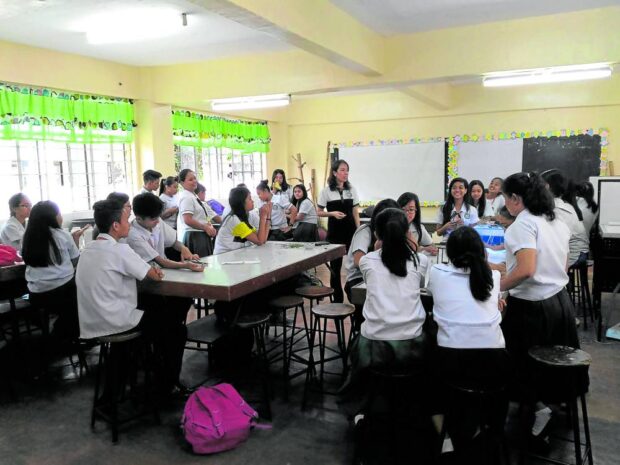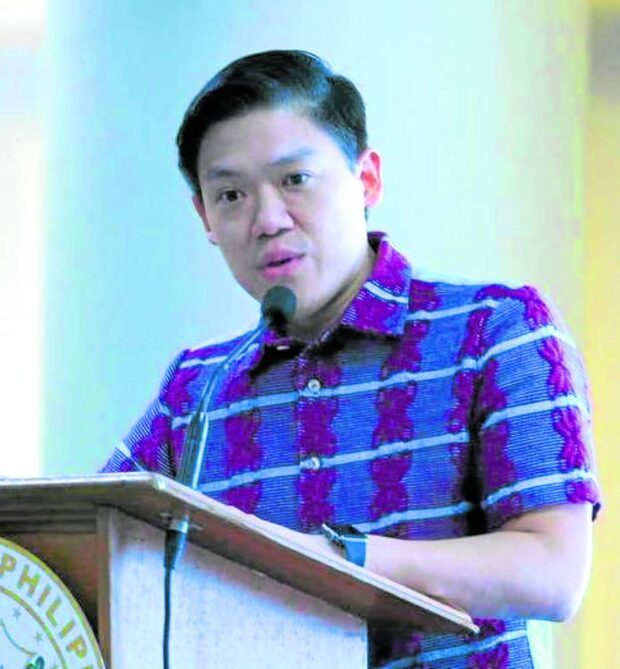Edcom 2: Filling broad gaps, seizing fragments of hope

EXTRA TASKS One of the first concerns raised at Edcom 2 is the heavy multitasking required of public school teachers. Based on initial findings, teachers today can have as many as 50 extra tasks outside their primary role. —INQUIRER FILE PHOTO
A large-scale international assessment of education systems around the world has recently revealed that 15-year-old Filipino students were still among the lowest scorers in three domain subjects in school—mathematics, reading and science.
Average scores in mathematics and reading increased by two and seven points respectively while in science, it decreased by one point—all statistically insignificant, based on the report prepared by the Organization for Economic Cooperation and Development (OECD).
Compared to the country’s performance four years ago, results of the latest Programme for International Student Assessment (Pisa) showed that despite the pandemic and school closures, the proficiencies of Filipino learners did not worsen but remained stagnant.
Still, it was a welcome development for some government officials, with the Department of Education (DepEd) saying that the test results indicated a “stable” performance of 15-year-old students despite the challenges of COVID-19.
The DepEd, which had early on set the expectations low, even held a formal event on Wednesday to present the 2022 Pisa results to different stakeholders, including legislators, representatives from the academe, private sector and other partner organizations.
While Education Undersecretary Gina Gonong was reporting on the country’s performance during the DepEd forum, there were occasional claps from the audience when the test results hinted at small wins like in the case of the National Capital Region and Calabarzon, which both achieved average scores that were statistically higher than the national average in all three subjects.
Pasig City Rep. Roman Romulo in his message of support said that “we should be celebrating” because, despite the struggles of remote learning, Filipino students managed to “hold the line.”
READ: Bongbong Marcos signs laws for 7 higher education institutions

Karol Mark Yee —EDCOM 2 FACEBOOK PAGE
READ: Education gets biggest share of BARMM budget for 2024
Silver lining vs reality
While some prefer to see the silver lining, the reality on the ground does not seem to merit any celebration.
According to education policy expert Karol Mark Yee, one of the glaring problems across all contexts in the Philippines was the poor literacy skills of students, in particular those who finished Grade 3 but could not read simple text or add basic numbers.
Yee, executive director of the Second Congressional Commission on Education (Edcom 2), said 90 percent of children who completed Grade 3 experienced difficulty in reading—a basic skill needed to build on other competencies.
“Learners are moving on, progressing to higher levels, without the foundational skills,” he told the Inquirer in an interview, noting that this problem of learning poverty—as the World Bank called it—was shared by all, even in the best schools in the country.
Edcom 2 is a national commission given three years to undertake a comprehensive assessment and evaluation of the performance of the entire Philippine education sector. Convened in January this year, it is composed of commissioners or legislators, an advisory council with experts from different fields and standing committees divided into themes.
In their assessment so far, one striking find for Yee is the existence of “many good efforts and intentions” hampered by the challenges in implementation.
The initiatives tend to be “fragmented,” he said, citing the case of teacher education, where the Commission on Higher Education had made improvements in revising the curriculum for the early childhood education program.
Despite that, the Professional Regulations Commission is yet to adjust how it tests teachers for the licensure exam because, in the current setup, Yee said, “If you finish early childhood education, you’re required to take elementary licensure, which is different from what you studied.”
Mind the nuances
Edcom 2’s ongoing evaluation also showed the struggles when it came to legislating or crafting policies and programs at the national level because the scope covers almost a million teachers and more than 21 million students in public schools.
“There are many nuances that national policies could not accommodate. And that is where the challenges lie—how to craft policies that are effective but are also context-specific or context-responsive,” Yee said.
Another factor is the availability of information that can be used to make evidence-based policies. “Data is very lacking and that’s what we’re trying to figure out: how to make data collection systematic, coordinated, so that it could really inform interventions,” Yee said.
Tops here, average abroad
Using the Pisa 2018 results, Edcom 2 is currently analyzing the performance of Filipino students. Based on their findings, the best performers in the Philippines are only as good as the lowest performers in Singapore. The top 25 percent of the Filipino students who took the exam were only as good as the average students in Malaysia, Indonesia and Thailand.
If there are any low-hanging fruits to address the crisis, Yee suggested focusing on nutrition and learning recovery first.
“In our research, it shows us that one in three Filipino children are malnourished and we have one of the highest stunting rates in the region,” he said.
The situation is alarming because stunting happens in the first 1,000 days or the early years, usually 0 to 4 years old.
“If you can’t resolve it at that point, you can’t reverse it later on and that has significant consequences because cognitive development happens in those early years,” Yee said.
Even if the senior high school curriculum improves or the implementation of free higher education becomes perfect, “it would be difficult to succeed because of the investments that we don’t have yet for nutrition.”
Nutrition, catch-up class
For this reason, Edcom 2 pushed for increased funding for the school-based feeding program, amounting to around P892 million next year, especially for municipalities with the highest stunting rates.
“If you have parishes, if you have feeding programs, please focus them on children 0 to 4 years old, if not 0 to 24 months and pregnant mothers,” Yee said. Another important step is to take the DepEd’s learning recovery efforts seriously.
Earlier this year, the department launched its National Learning Recovery Program whose components include the so-called learning camps to be conducted at the end of the school year; “Catch-up Fridays” wherein the entire day will be dedicated to enhancing literacy; and the National Math and Science programs whose details are still being finalized.
“It is so critical that we focus on the right learners,” Yee said, adding that for Edcom, such efforts should target Kindergarten to Grade 3, or the K3 stage where foundational skills are developed.
For organizations doing tutoring in support of schools, they should consider this target “because that would create huge ripple effects later on for the child.”
Addressing malnutrition and targeting K-3 learners can be prioritized “at the local level without waiting for laws and policies to be fixed.”
In a longer term, Yee underscored the need to resolve classroom shortages in the country. In some parts of the Philippines, classroom ratios have reached up to one for every 300 students or even one for every 400, forcing schools to have multiple shifts.
“We need to resolve that because how could you learn and how could you build 21st century learners if you don’t fit in the classroom and the teacher can’t hear the children who are at the back, jampacked?” Yee said.
DepEd hiring policies
The quality of teaching, specifically the pipeline of teachers, is another issue that needs to be resolved in the long run, Yee said.
To improve the quality of teacher education in higher education institutions, he said those that historically underperformed in the licensure exams must be phased out or monitored closely by the Commission on Higher Education.
50 ancillary tasks
The DepEd’s hiring policies also need review, according to Yee, because in some cases where schools lack, for example, a teacher who majored in science, the tendency was to hire someone who majored in a different subject or discipline like Filipino, which is not aligned with the subject.
“How will the teacher teach properly if they don’t have the knowledge to teach it?” he said.
In their consultations on the ground, Yee said many teachers lament the ancillary tasks that they need to do on top of teaching in classrooms.
“Sir, we only want to teach. Please help us teach because that is the last thing we’re able to do,” he recalled one teacher’s plea to him.
Citing the DepEd’s inventory, Yee said there are around “50 ancillary tasks” added to the workload of teachers.
The department said it was addressing the issue by reducing administrative tasks and hiring nonteaching staff who would perform the duties instead.